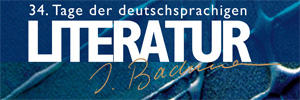 Publikum (Bild: Johannes Puch)
Publikum (Bild: Johannes Puch)
Day two: a first favourite?
On the second morning of readings, German author Aleks Scholz received much praise for his text “Google Earth”. Only juror Burkhard Spinnen accused it of being “heartless”. Judith Zander’s text was also relatively well received, Ballhausen and Kleindienst not so much.
Mysterious or without mystery?
Thomas Ballhausen, who read his text on Friday morning, was the first Austrian in this year’s competition. The jury could not agree whether his text “Cave Canem” was mysterious or without any mystery at all. While some mocked the empty images (“simply obscurity”), others drew parallels with Dorothee Elmiger’s text, which had been well received.
Jury discussion Thomas Ballhausen
Scharnigg: too many “linguistic slip-ups”
German author Max Scharnigg read “Die Besteigung der Eigernordwand unter einer Treppe”. The majority of the jury didn’t like the text because of its linguistic “slip-ups”, and ultimately part of the jury was “sceptical” (H.E. Keller) and others “baffled” (Feßmann) by the text. Despite some alluded parallels to Kafka’s Hunger Artist (Burkhard Spinnen), Scharnigg’s idea to let his protagonist live “with a great deal of words” without food or metabolism, stayed “stuck in the stairs” (Sulzer).
Much praise from the jury for Scholz’s perspective
Aleks Scholz concluded the second morning of readings in Klagenfurt with his text “Google Earth” and stimulated a discussion that escalated. The text that was suggested by Hubert Winkels for Klagenfurt was mostly received positively – only Burkhard Spinnen reproached the “flawless” text for being “heartless”. Others praised its “great linguistic precision” (Keller) and the “charming narrative attitude” in lofty heights (Fleischanderl).
Boredom or “narrative calm”?
The afternoon continued with Judith Zander’s text “Dinge, die wir heute sagten”. Zander’s novel manuscript tells the story of a 16-year-old girl from the GDR whose attitude to life is completely apathetic and who fell pregnant as the result being raped. Where Meike Feßmann saw “great narrative calm”, other colleagues where bored. Keller defended the “story of an alienation” selected by her: the character has to “learn to walk again – but doesn’t want to”.
Kleindienst under “suspicion of pornography”
Josef Kleindienst from Austria was the final author of the second day of readings. He presented his text “Ausgehen” to the jury and the audience. The text with its suspicion of pornography as voiced by the jury fell into an abyss, so to speak. “A brutal text about a brutal act”, was Alain Claude Sulzer’s judgement, who called the text “perfect” in this sense, but wasn’t sure, just like his colleagues, whether it is “voyeuristic”. Karin Fleischanderl tried to defend it but her attempts to explain her position (“The text does you good”) were in vain.
Jury discussion Josef Kleindienst
Day one: no favourite, lots of praise for Elmiger
 TDDl 2010
TDDl 2010